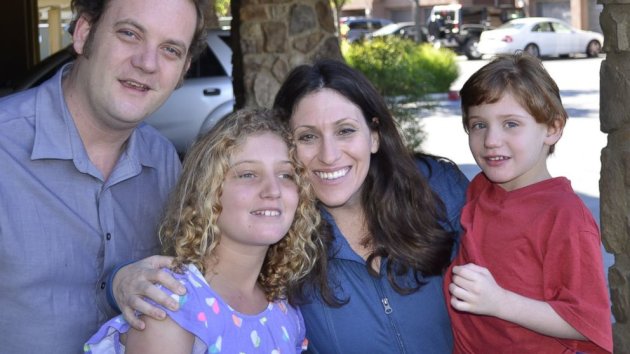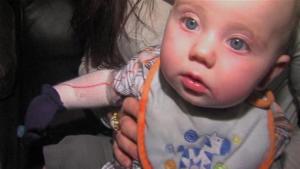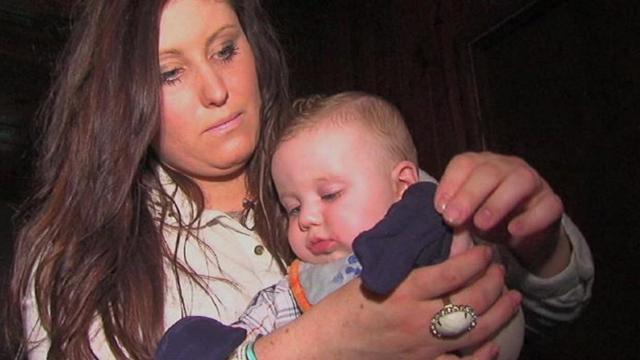
Their son has been diagnosed with severe autism and intermittent explosive disorder and has had five hospitalizations at a UCLA psychiatric facility this year, his parents said.
“The first challenge is you’re not sure your children are going to make it,” said Schofield. “Right now, we are afraid Bodhi will crack his skull open or at least severely injure himself. With Jani, there was the fear of suicide after she made a couple of attempts. It’s a threat to the basic survival of your children.”
The Los Angeles couple, who have been married since 1994, went public with their story to highlight the struggle of parents raising children with mental illness. They have devoted their entire lives to keeping their family together and not sending their children to a psychiatric institution. But the strain is taking a toll.
“There is a significant divorce rate in at least 75 percent of couples in these situations,” said Susan Schofield, 44, an Internet radio show host. “With hardly any respite care, there have been problems in our marriage. We haven’t been out on a date in 15 weeks. There just isn’t enough support out there.”
The Schofields’ difficult journey with Jani has been highlighted by Discovery Fit & Health television in several episodes since 2010. On May 26 during the network’s “Psych Week,” a sequel, “Born Schizophrenic: Jani and Bodhi’s Journey,” will air.
When Jani was younger she had visual and auditory hallucinations –- rats that she named “Wednesday” and cats named “midnight” and little girls named “24 hours.”
Jani is now on medication and making great progress, but Bodhi is not, the Schofields said. Mental illness runs in both sides of the family.
"Black Swan" analyzes ballerina's descent into schizophrenia.
Dr. Mark DeAntonio, who is treating Bodhi, said the boy has “something different” than his sister.
“What led us to Bodhi’s diagnosis was she was having auditory and visual hallucinations that were bizarre and morbid,” he said in the documentary. “It was a fantasy world animals lived in.’
“Bodhi’s behaviors and psychiatric issues are consistent with someone who has autism,” said DeAntonio. “He has episodes of severe agitation and self-harm and there is no clear reason why he is falling down and hurting himself, biting himself. It’s most distressing.”
His mother is convinced Bodhi will eventually get a similar diagnosis as Jani. “I believe it will come out later as basically schizophrenia with a lot of autistic traits.”
Childhood schizophrenia is rare, according to psychiatrist Dr. Igor Galynker, director of the Family Center for Bipolar at Mount Sinai Beth Israel in New York City. Fewer than 1 percent of all cases start in childhood.
“Having two children with COS is probably even more rare by an order of magnitude,” said Galynker, who did not treat Jani.
Schizophrenia onset before age 13 is characterized by behavioral and cognitive symptoms that overlap with features of autism spectrum and disruptive behavior disorders, according to a 2007 article in Psychiatric Times. Early diagnosis is important to maximize treatment.
Today, Jani is about to finish sixth grade and is now calm enough to leave a program for emotionally disturbed children and go into a contained classroom in a junior high school. “I never expected that to happen,” said her mother.
“The boys her age are older and bigger and some of them, because of their illnesses, have the potential for violence and aggression,” said her father. “For her own safety, that is best. It’s a huge step for her.”
She may go to college eventually, but the focus now is on adaptive life skills and hygiene, which is typically problematic for those with schizophrenia.
“It’s critical to her survival because loss of hygiene is the first step on the road to homelessness,” said Michael Schofield. “There is a disconnect between the mind and the body and they don’t feel what we would.”
Bodhi is on an array of anti-psychotic medications, as is his sister -- lithium and the antipsychotic Zyprexia. But Bodhi is not as verbal, so he cannot tell his parents what he is seeing or feeling. And events as simple as having to go to the bathroom can trigger an explosive fit.
Several times a year, when his parents cannot control his violent outbursts, the Schofields take him to the hospital where he is sedated and restrained in a “modern day straight jacket” to prevent him from hurting himself, said Susan Schofield. “The hospital says it was the worst case they had ever seen.”
The family has health insurance, but Michael Schofield has been forced to limit his teaching to online classes. They have difficulty paying the bills because for them, Jani and Bodhi are a full-time job. The couple also runs a nonprofit for autistic children, Jani’s Foundation.
“We have begged the regional center for respite care to give us some time off,” said Susan Schofield. “For just two to three hours, we could go out on our own.”
But often help doesn’t show up and there is no back-up.
The couple has had marital problems as a result. Michael Schofield had an affair, for which he “takes full responsibility.” His wife said she also blames herself for being “so tired” at the end of the day.
“Our second fear is that our children will never be entirely independent,” he said. “What are they going to do when we are dead and gone? Who will provide the support?”
Neither have extended family who could help out with the children. Michael Schofield was born in Australia and hasn’t seen his mother since he was 15. Susan Schofield’s parents are “too old to physically handle the situation,” she said.
Still, both parents feel hope about their children’s future.
“Jani has come so far,” said Michael Schofield.
“She is an inspiration,” echoed his wife, who said she is “working through” her husband’s infidelity. “We have to keep the family intact.”




















